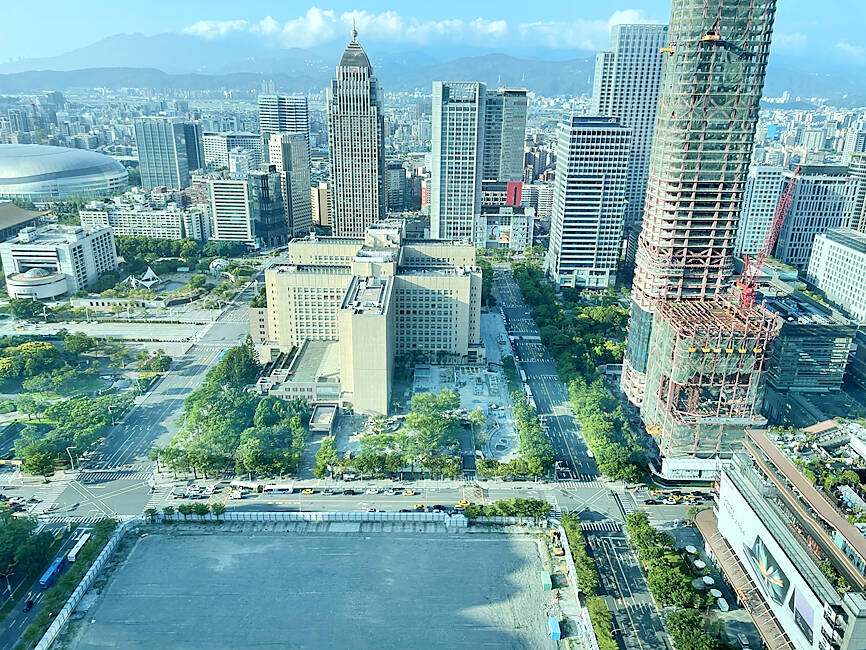The vacancy rate for grade-A offices in Taipei last quarter climbed to 2.7 percent, as companies reduced space utilization and moved to less popular areas to save on operating costs amid economic weakness, property consultancy Jones Lang LaSalle Taiwan (JLL Taiwan, 仲量聯行) said yesterday.
However, monthly rents still rose 2 percent from a year earlier to NT$2,981 (US$97.89) per ping (3.3m2) with rents in the prime Xinyi District (信義) remaining above NT$5,000 per ping, due to healthy demand and limited supply, JLL Taiwan’s office leasing advisory director Christina Yu (游淑芬) said.
“The data show that the leasing market took a hit from an economic slowdown, which has prompted corporate tenants to trim office space or relocate to less expensive locations to control costs,” Yu told a media briefing.

Photo: Hsu Yi-ping, Taipei Times
Cost controls would further accelerate relocation to suburban areas, with Nangang District (南港) likely to be the biggest beneficiary, as 290,000 ping of new office space is to enter the market there between this year and 2027, bigger than the existing supply in central locations, the analyst said.
By measure of rent growth, Taipei outperformed other markets in the region due to its relative rent affordability, JLL Taiwan said.
However, the gap is narrowing, as office rents in Hong Kong are 2.5 times those in Taipei, when they used to be 3 times higher, Yu said.
JLL Taiwan has seen rent premiums of up to 15 percent for office buildings with energy conservation certificates, as corporations at home and abroad assign more importance to environmental friendliness and sustainable governance.
New JLL Taiwan managing director Kevin Hou (侯文信) said the consultancy would tap into that demand by helping clients obtain green certificates.
More than 50 percent of Grade-A office buildings in Taipei are older than 20 years and only 6 percent meet sustainable governance standards, Hou said, adding that 40 percent of carbon emissions come from property development and operations.
Old buildings use more electricity, Hou said.
Corrections in the office space market are due to a lack of business confidence and over-hiring over the past few years, he said, adding that the adjustment cycle would last for a while.
JLL Taiwan executive chairman Tony Chao (趙正義) said he is less pessimistic, and believes that urban renewal and railroad construction would continue to support Taiwan’s commercial and investment markets.
At the same time, companies that are returning home would display real demand for industrial properties, Chao said.

RUN IT BACK: A succesful first project working with hyperscalers to design chips encouraged MediaTek to start a second project, aiming to hit stride in 2028 MediaTek Inc (聯發科), the world’s biggest smartphone chip supplier, yesterday said it is engaging a second hyperscaler to help design artificial intelligence (AI) accelerators used in data centers following a similar project expected to generate revenue streams soon. The first AI accelerator project is to bring in US$1 billion revenue next year and several billion US dollars more in 2027, MediaTek chief executive officer Rick Tsai (蔡力行) told a virtual investor conference yesterday. The second AI accelerator project is expected to contribute to revenue beginning in 2028, Tsai said. MediaTek yesterday raised its revenue forecast for the global AI accelerator used

TEMPORARY TRUCE: China has made concessions to ease rare earth trade controls, among others, while Washington holds fire on a 100% tariff on all Chinese goods China is effectively suspending implementation of additional export controls on rare earth metals and terminating investigations targeting US companies in the semiconductor supply chain, the White House announced. The White House on Saturday issued a fact sheet outlining some details of the trade pact agreed to earlier in the week by US President Donald Trump and Chinese President Xi Jinping (習近平) that aimed to ease tensions between the world’s two largest economies. Under the deal, China is to issue general licenses valid for exports of rare earths, gallium, germanium, antimony and graphite “for the benefit of US end users and their suppliers

Dutch chipmaker Nexperia BV’s China unit yesterday said that it had established sufficient inventories of finished goods and works-in-progress, and that its supply chain remained secure and stable after its parent halted wafer supplies. The Dutch company suspended supplies of wafers to its Chinese assembly plant a week ago, calling it “a direct consequence of the local management’s recent failure to comply with the agreed contractual payment terms,” Reuters reported on Friday last week. Its China unit called Nexperia’s suspension “unilateral” and “extremely irresponsible,” adding that the Dutch parent’s claim about contractual payment was “misleading and highly deceptive,” according to a statement

Artificial intelligence (AI) giant Nvidia Corp’s most advanced chips would be reserved for US companies and kept out of China and other countries, US President Donald Trump said. During an interview that aired on Sunday on CBS’ 60 Minutes program and in comments to reporters aboard Air Force One, Trump said only US customers should have access to the top-end Blackwell chips offered by Nvidia, the world’s most valuable company by market capitalization. “The most advanced, we will not let anybody have them other than the United States,” he told CBS, echoing remarks made earlier to reporters as he returned to Washington